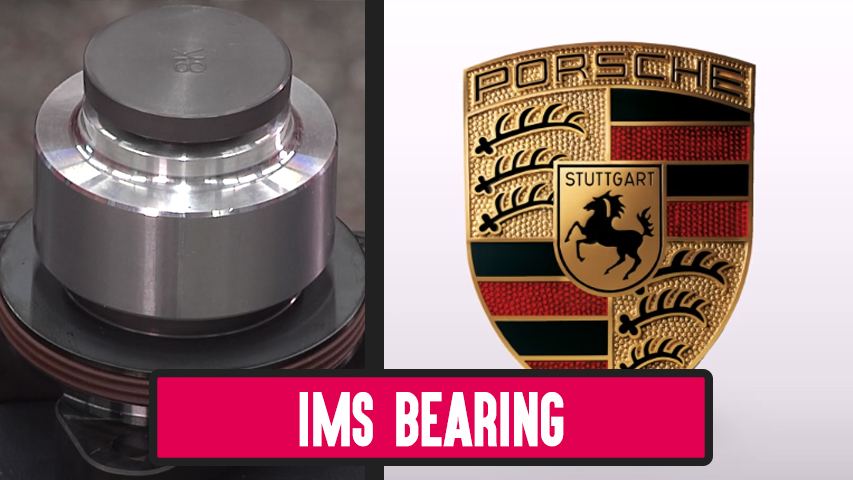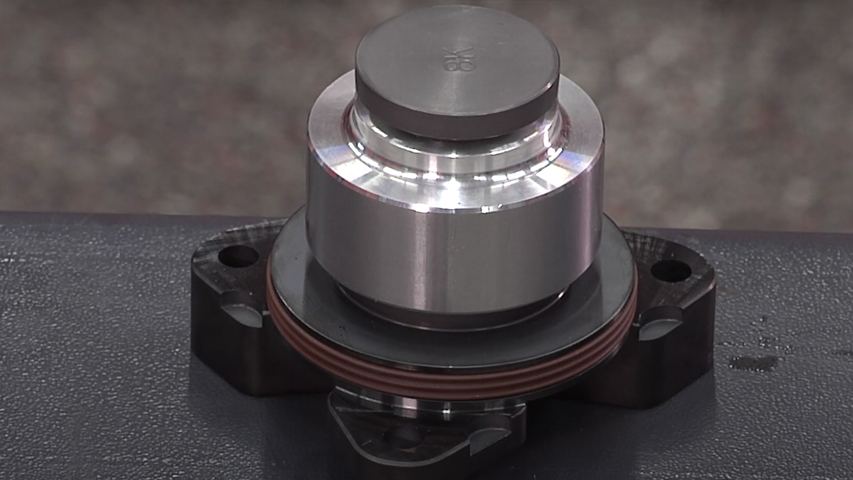
Porsche IMS bearing, a beating heart that needs care!
Do you own a High Class Porsche Model ? Have you ever heard of IMS bearings ? This small part plays a very important role in the operation of your car’s Engine !
IMS bearing failure can have irreparable consequences for the car’s engine and impose heavy costs on you. In this article, we will examine the IMS bearing, its causes, warning signs and ways to prevent and repair it.
The IMS bearing (Intermediate Shaft Bearing) is a vital piece in many sports cars, especially with High Speed Porsche Models . The bearing is responsible for supporting the middle shaft of the engine, and its failure can lead to serious damage and even engine locking.
Therefore, deep knowledge of IMS bearings, its signs of failure, and methods of replacement and Prevention of failure are very important for the owners of these cars.
Imagine you’re driving your beautiful Porsche when suddenly the car engine goes out with a strange sound. This could be the nightmare of any Porsche rider.
Interestingly, in many cases, the cause of this problem is the failure of the IMS bearing. Studies show that IMS bearing failure is one of the most common technical problems in some Porsche models, especially those produced in the 1990s and early 2000s.

What is IMS bearing?
The IMS bearing is a roller bearing located at the end of the middle shaft of the engine. This shaft is responsible for directing oil to other parts of the engine.
If the IMS bearing fails the oil supply to the engine is disrupted and the engine is damaged.

Causes of IMS bearing Failure
1. incomplete design in some models: one of the main causes of IMS bearing failure in some Porsche models is the incomplete design of the bearing itself and its housing.
2. use of Poor quality oil : using Poor quality oil or not changing engine oil in time can increase the friction and wear of the bearing.
3. high performance of the car: with increased performance of the car, the IMS bearing is also exposed to wear and tear.
4. engine overheating: high engine temperature can damage the IMS bearing.

Signs of IMS bearing failure
1. unusual noise from the engine
2. reduced engine power
3. engine failure
4. increased oil consumption
5. engine vibration
| The Porsche model | Years affected | Common signs of failure | Estimated failure rate |
| 911 (996) | 1998-2005 | Sound, reduced power, oil consumption. | 15-25% of cars produced in this time frame |
| 911 (996) | 2005-2012 | Sound, engine failure, vibration. | 10-18% of cars produced in this time frame |
| Boxster(986) | 1997-2004 | Sound, decreased power, increased oil consumption. | 20-30% of cars produced in this time frame |
| Boxster(986) | 2005-2012 | Sound, engine failure, vibration. | 12-20% of cars produced in this time frame |
| Cayman(987) | 2005-2012 | Sound, reduced power, oil consumption. | 15-25% of cars produced in this time frame |

IMS bearing replacement
IMS bearing replacement is a specialized job and must be done by skilled mechanics. When replacing bearings, it is better to use high-quality, original bearings. It is also recommended that other related parts be checked and replaced as needed along with the bearing replacement.
The importance of going to a specialist mechanic to replace the IMS bearing
IMS bearing replacement is a complex and specialized process that requires sufficient technical knowledge and experience. Doing this by non-specialists can have irreparable consequences for the car’s engine and even lead to more serious injuries.

Why should we see a specialist mechanic?
In-depth technical knowledge: expert mechanics are well familiar with Porsche engine structure and IMS bearing performance and can accurately diagnose the problem.
Specialized tools: special and specialized tools are needed to replace the IMS bearing, which is only available to professional mechanics.
Practical experience: expert mechanics have gained enough experience to do this correctly and safely by performing numerous repairs.
Quality Guarantee: many expert mechanics offer quality guarantee for the repair work they perform.

Consequences of visiting non-experts:
Engine damage: improper repair can cause damage to other engine parts and increase repair costs.
Reducing the useful life of the car: unprincipled repairs can reduce the useful life of the car.
Creating new problems: new problems may arise for the vehicle during repair.
IMS bearing replacement steps
The exact steps of replacing the IMS bearing may vary slightly depending on the model of the car and the type of bearing. But in general the following steps are included:
Engine opening: first, the parts of the engine that have access to the IMS bearing must be opened.
Removing old bearings: old bearings are removed using specialized tools.
Installation site cleaning: the installation site of the bearing is carefully cleaned to prevent contamination from entering the engine.
New bearing installation: The New bearing is carefully positioned.
Tightening screws: the bearing holder screws are tightened with a certain torque.
Re-inspection: after the work is complete, all connections are checked again to ensure their firmness.
Lubrication: different parts of the engine are lubricated.
Car test: after the repair is complete, the car is turned on and its operation is checked.

Approximate Cost of IMS bearing replacement
The cost of replacing the IMS bearing depends on several factors, including:
Car model: the cost of repairs varies from Porsche to Porsche.
Type of bearing: original bearings are usually more expensive than scattered bearings.
Mechanical wages: the wages of mechanics vary in different regions and according to their experience.
Side costs: other side costs, such as the cost of transporting a car or the cost of buying spare parts, may also be added to the overall cost.
In general, the cost of replacing the IMS bearing can be very high, and it is better to get prices from several different mechanics before making repairs.
– IMS bearings in various Porsche models
Why are some Porsche models more prone to IMS bearing failure?
Several reasons make some Porsche models more susceptible to IMS bearing failure than others. These reasons include:
Initial design of the bearing: in some older models, the initial design of the IMS bearing was such that it was not strong enough and showed less resistance to wear and tear.
Harder working conditions: Porsche’s sporty and powerful models are usually in more difficult working conditions, which can increase the pressure on the IMS bearing.

Quality of raw materials: the quality of raw materials used in the production of IMS bearings can also affect its useful life.
Driving style: aggressive driving style and continuous use of high RPMs can increase engine temperature and thus reduce the useful life of the bearing.
Which Porsche Models are most at Risk?

In general, Porsche models produced in the 1990s and early 2000s are more prone to IMS bearing failure. Some of these models include:
Porsche 911 (generations 996 and 997): these models are at higher risk of failure due to the initial design of the IMS bearing and the use of inappropriate oil in some cases.
Porsche Boxter: early Boxter models also suffer from IMS bearing failure due to technical similarities with the Porsche 911.
Porsche Cayman: Cayman models may also face the problem of IMS bearing failure due to the use of engines similar to the Porsche 911.

Failure statistics on different Models
Unfortunately, accurate statistics of IMS bearing failure are not available on various Porsche models.
Because these statistics depend on a variety of factors, such as car maintenance conditions, driving style and quality of replacement parts.
However, based on the experience of mechanics and user reports, it can be said that the models mentioned above are more at risk of IMS bearing failure. Also, cars that are highly functional and are constantly used in harsh conditions are more prone to this problem.
Preventing the failure of the IMS bearing
To prevent IMS bearing failure, you can do the following:
- Use the right oil: use high-quality engine oil that fits the vehicle’s specifications.
- Regular periodic services: perform regular vehicle periodic services to ensure overall engine health.
- Pay attention to engine temperature: avoid overheating of the engine.
- Changing driving style: try to avoid aggressive driving style and do not use high rounds consistently.
- Preventive replacement: if possible, you can replace the IMS bearing in a preventive manner to avoid serious problems.

Conclusions
The IMS bearing is the beating heart of your Porsche engine. By knowing deeply about this piece and the causes of its failure, you can avoid serious problems and heavy costs. Remember that timely replacement of IMS bearings and periodic service will extend the service life of your car and you will enjoy driving your Porsche more.
Have you encountered the problem of IMS bearing failure in your Porsche? Share your experiences with us in the comments section.
Also, if you are looking for more information about Porsche car maintenance, you can visit our website https://bestgermancar.com/.



